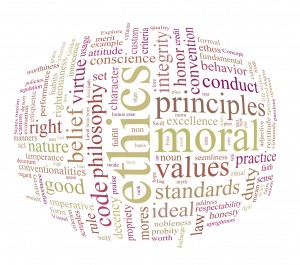In one of my previous post’s I provided some details about a range of particularly interesting learning outcomes (LOs) related papers that I’d come across during the course of my systematic review of the LOs literature. In this post I would like to highlight a few more that readers interested in this topic might like to explore. In particular, I would like to focus on papers that discuss the development and/or importance of affective LOs as opposed to those outcomes which largely focus on curriculum content. Again, some of my previous posts will show my specific interest in this area.
I have hyperlinked each paper to its journal webpage but I’ve also given the full reference details in case readers cannot access the journal site. I have pasted in the author’s abstact and refrained from giving my own summary of the paper so that readers may read it with an open mind and take their own particular message(s) from it. Many of the papers relate to a specific discipline, but their points concern the topic of affective LOs as a whole:
Abstract: Contemporary architectural education has shifted from the traditional focus on providing students with specific knowledge and skill sets or ‘inputs’ to outcome based, student-centred educational approach. Within the outcome based model, students’ performance is assessed against measureable objectives that relate acquired knowledge and skills to performance expectations in higher level courses or real world architectural practice. Bloom’s taxonomy has been widely accepted as a useful tool for defining learning outcomes. It references three domains that impinge on the learning process including the ‘cognitive,’ ‘affective’ and ‘psychomotor.’ In practice, most of the attention is paid to the cognitive domain. Considering the interdisciplinary and multivalent character of architecture (as discipline), curriculum design cannot be founded primarily on cognitive-based outcomes. This paper argues that affective domain, especially in the field of building learners’ personalized value systems, is essential to designing outcome based architectural programs. Interactive studio-based education provides a platform to integrate cognitive and behavioural skills that are necessary for professional practice.
Abstract: The focus of this paper is on the use of e-technologies to enable higher education to better assess aspects of learning that have proved difficult to assess using more conventional means. Higher education describes the knowledge and abilities it intends its graduates to have acquired before graduation, and it has a wide range of approaches to assess these. Higher education also seeks affective outcomes in the form of values, attitudes, behaviours and related attributes or dispositions, and these have consistently proved more difficult to assess by examination or assignment. After graduation, however, graduates are often assessed within the professions via portfolios, interview and peer or expert review. Assessment may focus on teamwork and networking skills, productivity, creativity and values fit to the profession. How can e-technologies help with these forms of assessment? This paper reviews some of the e-based approaches and explorations that have supported or could support assessment of affective attributes. At each stage, the paper seeks to establish the common elements of assessment in the different regimes and how e-assessment contributes, or may contribute in the future. The paper concludes that many of the strengths of e-assessment lend themselves to an evaluation paradigm rather than to conventional assessment for intended learning outcomes.
Abstract: Respecting religious diversity while also staying true to the role of faith in theological practice remains a challenge in contemporary education. This is made more complex by the role of learning outcomes to assess student learning. This article first emphasizes the role of faith in theological discourse and then raises questions about the nature of learning outcomes. As they are generally applied, learning outcomes have difficulty accounting for faith and might not lead to the contextual and relational learning that are strong motivators for student success. Finally, it is recognized that the globalized world provides a setting where relationships are vitally important. When theology and educational theory take relationships seriously, it becomes possible to conduct theology in an authentic way while also adapting to what current research suggests are best practices concerning learning outcomes.
Abstract: What is the role of biblical studies in a liberal arts curriculum? At the 2009 North American Society of Biblical Literature conference, a panel of seven Bible scholars provided brief analyses and arguments about the appropriate goals of teaching biblical studies in undergraduate contexts in this historical moment. They consider and critique the notion of specific Student Learning Outcomes or Objectives (SLOs) for courses about the Bible. In the process they address questions such as: what is the relative importance of “coverage” (biblical literacy, disciplinary knowledge and methods, and the historical creation of the biblical texts) versus modern and historical reception and uses of these texts? In their contributions, the authors analyze ways that a biblical studies course can develop the critical reading and writing skills that are the hallmark of undergraduate education. Some authors find these skills furthered by not bracketing from study the normative truth claims in the texts and instead strategically and critically encouraging the identity work and religious seeking associated with religious uses of these texts. Others call attention to the institutional and classroom power dynamics which inform and are constituted by the current student learning outcomes movement.
Abstract: The article raises a problematic issue regarding an insufficient base of the conception of learning outcomes in the Bloom’s taxonomy affective domain. The search for solutions introduces the conception of teaching and learning in the affective domain as well as presents validity criteria of learning outcomes in the affective domain. The possibilities for the assessment of learning achievements in the mentioned domain are identified. The peculiarities of learning outcomes in the affective domain discussed in the documents regulating European and Lithuanian higher education are shown.
The following two papers I have already commented on several times in previous posts, but they deserve specific mention within this particular topic:
Abstract: This paper sets out to discuss the commonalities that can be found in learning outcomes (LOs) for education for sustainable development in the context of the Tbilisi and Barcelona declarations. The commonalities include systemic or holistic thinking, the integration of different perspectives, skills such as critical thinking, change agent abilities and communication, and finally different attitudes and values.
Abstract: The purpose of this paper is to interpret aspects of education for sustainability in relation to educational theories of the affective domain (values, attitudes and behaviours) and suggest how the use of these theories, and relevant experience, in other educational areas could benefit education for sustainability.
Happy reading!






 Subscribe to Kerry Dobbins's posts
Subscribe to Kerry Dobbins's posts
Comments are closed, but trackbacks and pingbacks are open.